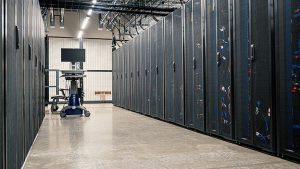
With such a culture of growth and innovation it is of little surprise that many of the nation’s SMBs and SOHO businesses rely heavily on technological innovation to power their development. This is also reflected in the UK’s digital transformation market. It was worth £28 billion in 2022, and is expected to continue to grow at a compound annual rate (CAGR) of 27.7% from 2023 to 2030.
While a reliance on innovative technology can fuel rapid growth, it does come with challenges. Most notably, the challenges are how to store large volumes of data economically, gain insight from it and access it on demand. Future technological growth areas including AI, analytics, and cloud computing. All these produce vast volumes of data – this is a challenge which will only increase.
Fortunately, storage technology has advanced significantly. There are now a multitude of effective and easy-to-use solutions on the market to support SMB and SOHO storage and backup needs. For most small businesses a network-attached storage (NAS) solution is often the solution of choice.
The Importance of Storage
For an SMB or SOHO to succeed in the current climate, reliable storage solutions are critically important to protect their information, guarantee performance and increase digital productivity. The leading solutions are those which enable real-time access to data on demand and allow access when in remote locations. This allows teams to collaborate on projects, even when they are not in the office.
Data is fuelling modern business, so managing and protecting data is essential. The ways organisations can lose access to their data can include human error, device failure or a natural disaster.
Experts now recommend using multiple forms of backup and storing data in different locations so it is protected. Today, there are several ways for SMBs and SOHOs to store, backup, and manage their data. From the cloud to local storage solutions such as network-attached storage, each technology brings different advantages that businesses can leverage depending on their needs.
NAS, An Overview
NAS, network-attached storage (NAS), is a form of a personal cloud storage solution. It can be a great option for any SMB or SOHO focused on throughput and capacity for file sharing, backup, and content archiving. They are simple and come with different data protection options and features. All these help businesses manage and keep their large files such as photography, video and documents, safe. In addition, it supports organisations to scale their storage on demand and help to store and access their data remotely.
In a NAS solution, data is stored centrally in a group of bay. They are typically filled with hard disk drives (HDDs) and/or solid-state drives (SSDs). Unlike a public cloud solution, NAS storage is managed locally, onsite. It is fully under the control of the organisation and connected to the local network. It can be operated and accessed 24/7 with control and access being delegated to individual users.
Creating a solid NAS environment is a necessity for backup, data protection, remote access, and digital collaboration. This is terrific for modern businesses with hybrid working models.
Why Western Digital?
Western Digital provides powerful data storage solutions. These enable SMBs and SOHOs to store their data to help them gain insight, create breakthrough innovations and actualise their aspirations. When it comes to NAS, Western Digital has a complete family of storage solutions. Namely, the WD Red™ Plus and Pro family of HDDs and SSDs:
WD Red™ Plus and WD Red™ Pro HDD are proven NAS drives. They are focused entirely on small businesses, home office environments and larger organizations with a significant number of concurrent users. These drives provide the capacity, performance and reliability SMBs and SOHOs need to store and protect personal data and work files.
The WD Red™ Plus HDDs are available in capacities from 1TB to 14TB[1], with speeds up to 210MB/s[2] and the WD Red™ Pro HDDs are available in capacities from 2TB to 22TB, with speeds up to 272MB/s.
WD Red™ SA500 SATA and WD Red™ SN700 NVMe™ SSD are useful for improving NAS performance and efficiently caching large files for the most demanding environments. The WD Red™ SSD family is designed to handle high-intensity workloads in always-on environments, increasing staff efficiency and productivity by allowing NAS systems to quickly synchronize and share files, including backup folders, reliably and at high speed. They are purpose-built and tested to be compatible with many of today’s most popular NAS systems for maximum flexibility to optimise workflows.
[1] 1MB = 1 million bytes, 1GB = 1 billion bytes and 1TB = 1 trillion bytes. Actual user capacity may be less depending on operating environment
[2] Workload rate is defined as the amount of user data transferred to or from the hard drive. Workload rates is annualized (TB transferred X (8760 / recorded power-on hours)). Workload rate will vary depending on your hardware and software components and configurations.

























